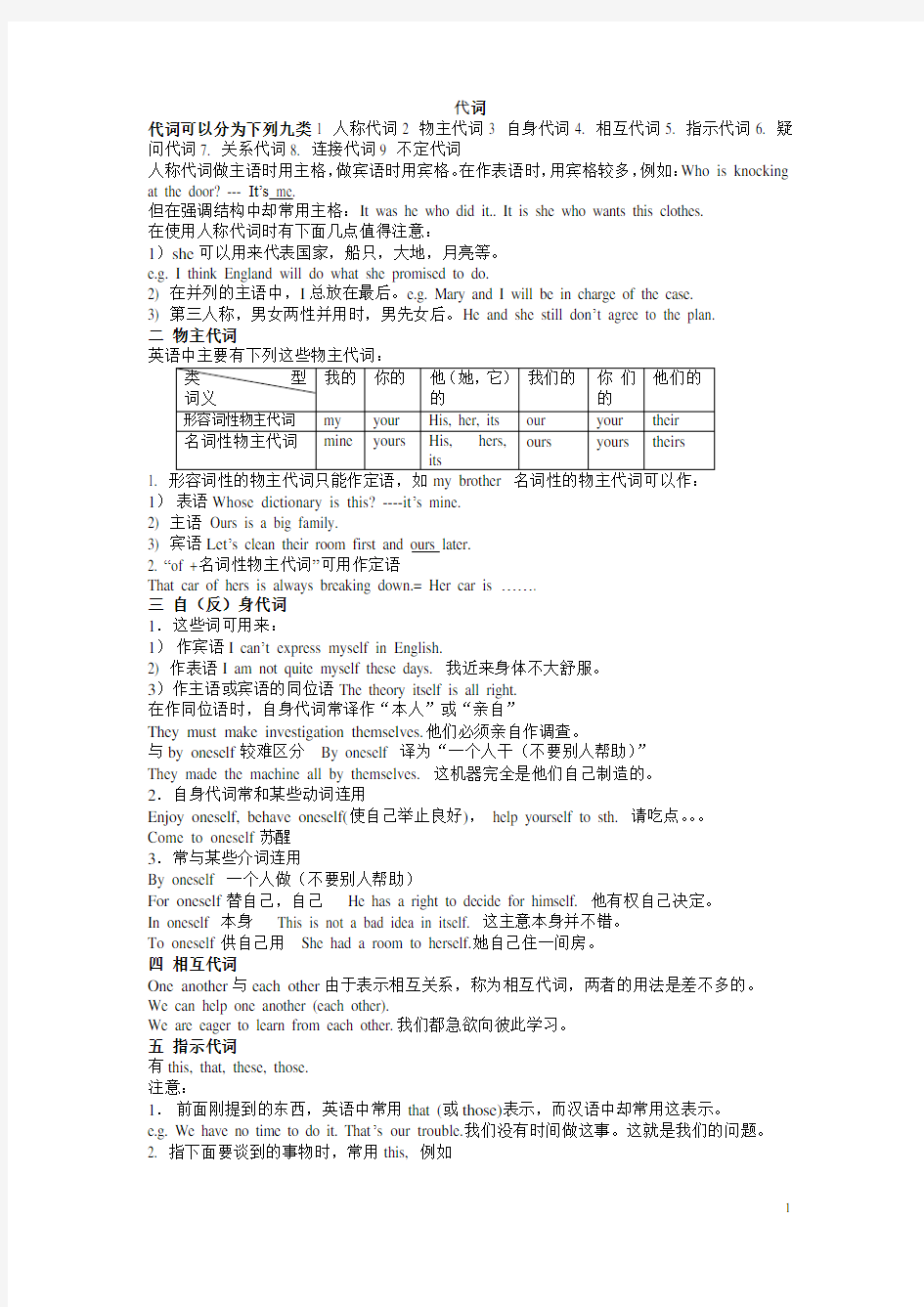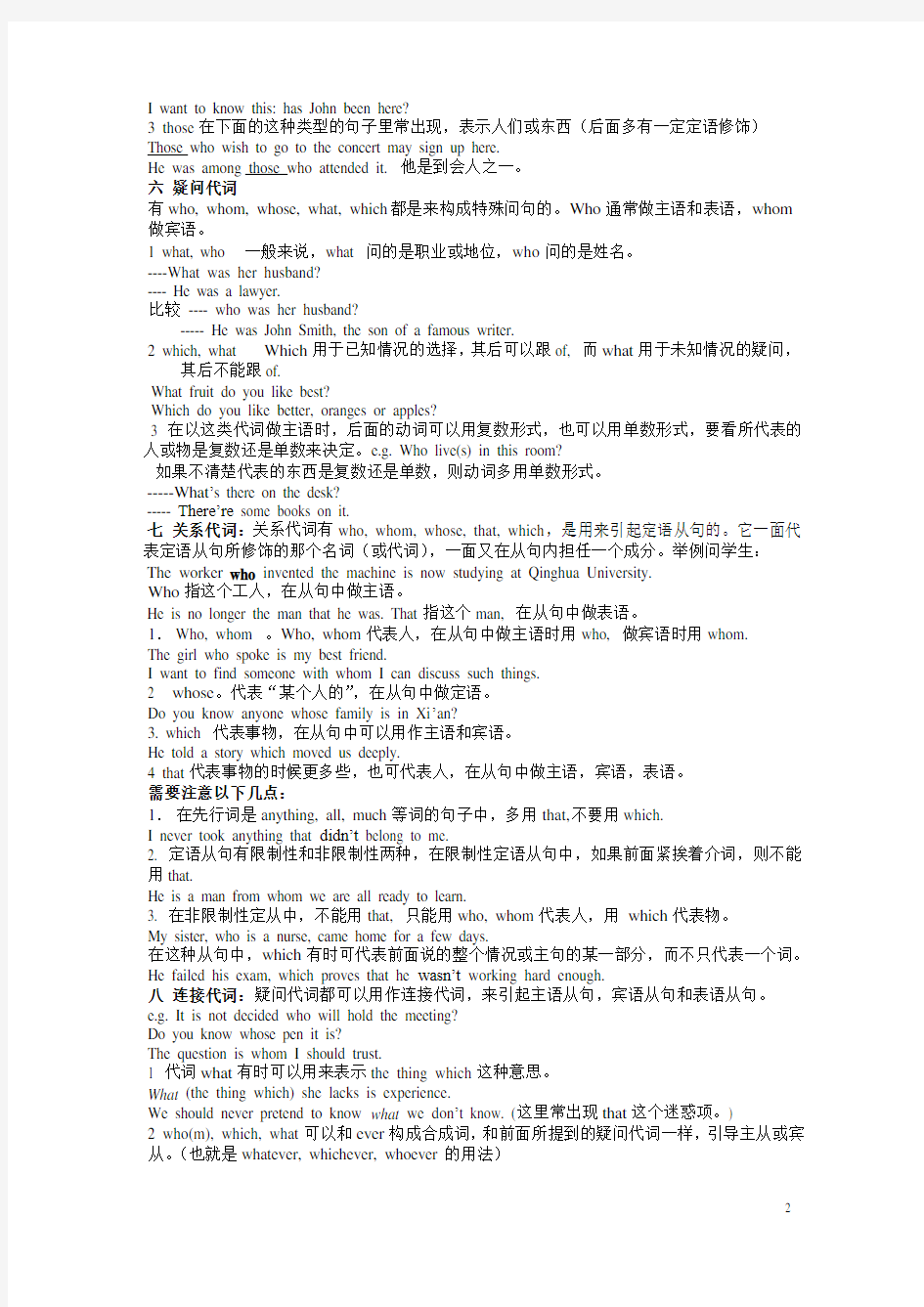(完整版)高中英语代词讲解与练习(附答案)


代词
代词可以分为下列九类1 人称代词2 物主代词3 自身代词4. 相互代词5. 指示代词6. 疑问代词7. 关系代词8. 连接代词9 不定代词
人称代词做主语时用主格,做宾语时用宾格。在作表语时,用宾格较多,例如:Who is knocking at the door? --- It’s me.
但在强调结构中却常用主格:It was he who did it.. It is she who wants this clothes.
在使用人称代词时有下面几点值得注意:
1)she可以用来代表国家,船只,大地,月亮等。
e.g. I think England will do what she promised to do.
2) 在并列的主语中,I总放在最后。e.g. Mary and I will be in charge of the case.
3) 第三人称,男女两性并用时,男先女后。He and she still don’t agree to the plan.
二物主代词
1.
1)表语Whose dictionary is this? ----it’s mine.
2) 主语Ours is a big family.
3) 宾语Let’s clean their room first and ours later.
2. “of +名词性物主代词”可用作定语
That car of hers is always breaking down.= Her car is …….
三自(反)身代词
1.这些词可用来:
1)作宾语I can’t express myself in English.
2) 作表语I am not quite myself these days. 我近来身体不大舒服。
3)作主语或宾语的同位语The theory itself is all right.
在作同位语时,自身代词常译作“本人”或“亲自”
They must make investigation themselves.他们必须亲自作调查。
与by oneself较难区分By oneself 译为“一个人干(不要别人帮助)”
They made the machine all by themselves. 这机器完全是他们自己制造的。
2.自身代词常和某些动词连用
Enjoy oneself, behave oneself(使自己举止良好),help yourself to sth. 请吃点。。。
Come to oneself苏醒
3.常与某些介词连用
By oneself 一个人做(不要别人帮助)
For oneself替自己,自己He has a right to decide for himself. 他有权自己决定。
In oneself 本身This is not a bad idea in itself. 这主意本身并不错。
To oneself供自己用She had a room to herself.她自己住一间房。
四相互代词
One another与each other由于表示相互关系,称为相互代词,两者的用法是差不多的。
We can help one another (each other).
We are eager to learn from each other.我们都急欲向彼此学习。
五指示代词
有this, that, these, those.
注意:
1.前面刚提到的东西,英语中常用that (或those)表示,而汉语中却常用这表示。
e.g. We have no time to do it. That’s our trouble.我们没有时间做这事。这就是我们的问题。
2. 指下面要谈到的事物时,常用this, 例如
I want to know this: has John been here?
3 those在下面的这种类型的句子里常出现,表示人们或东西(后面多有一定定语修饰)Those who wish to go to the concert may sign up here.
He was among those who attended it. 他是到会人之一。
六疑问代词
有who, whom, whose, what, which都是来构成特殊问句的。Who通常做主语和表语,whom 做宾语。
1 what, who 一般来说,what 问的是职业或地位,who问的是姓名。
----What was her husband?
---- He was a lawyer.
比较---- who was her husband?
----- He was John Smith, the son of a famous writer.
2 which, what Which用于已知情况的选择,其后可以跟of, 而what用于未知情况的疑问,
其后不能跟of.
What fruit do you like best?
Which do you like better, oranges or apples?
3 在以这类代词做主语时,后面的动词可以用复数形式,也可以用单数形式,要看所代表的人或物是复数还是单数来决定。e.g. Who live(s) in this room?
如果不清楚代表的东西是复数还是单数,则动词多用单数形式。
-----What’s there on the desk?
----- There’re some books on it.
七关系代词:关系代词有who, whom, whose, that, which,是用来引起定语从句的。它一面代表定语从句所修饰的那个名词(或代词),一面又在从句内担任一个成分。举例问学生:
The worker who invented the machine is now studying at Qinghua University.
Who指这个工人,在从句中做主语。
He is no longer the man that he was. That指这个man, 在从句中做表语。
1.Who, whom 。Who, whom代表人,在从句中做主语时用who, 做宾语时用whom.
The girl who spoke is my best friend.
I want to find someone with whom I can discuss such things.
2 whose。代表“某个人的”,在从句中做定语。
Do you know anyone whose family is in Xi’an?
3. which 代表事物,在从句中可以用作主语和宾语。
He told a story which moved us deeply.
4 that代表事物的时候更多些,也可代表人,在从句中做主语,宾语,表语。
需要注意以下几点:
1.在先行词是anything, all, much等词的句子中,多用that,不要用which.
I never took anything that didn’t belong to me.
2. 定语从句有限制性和非限制性两种,在限制性定语从句中,如果前面紧挨着介词,则不能用that.
He is a man from whom we are all ready to learn.
3. 在非限制性定从中,不能用that, 只能用who, whom代表人,用which代表物。
My sister, who is a nurse, came home for a few days.
在这种从句中,which有时可代表前面说的整个情况或主句的某一部分,而不只代表一个词。He failed his exam, which proves that he wasn’t working hard enough.
八连接代词:疑问代词都可以用作连接代词,来引起主语从句,宾语从句和表语从句。
e.g. It is not decided who will hold the meeting?
Do you know whose pen it is?
The question is whom I should trust.
1 代词what有时可以用来表示the thing which这种意思。
What (the thing which) she lacks is experience.
We should never pretend to know what we don’t know. (这里常出现that这个迷惑项。)
2 who(m), which, what可以和ever构成合成词,和前面所提到的疑问代词一样,引导主从或宾从。(也就是whatever, whichever, whoever的用法)
Whatever he did was right.
Whoever makes mistakes must correct them.
九不定代词:英语中有下面这些不定代词:all, each, every, both, either, neither, one, none, little, few, many, much, other, another, some, any, no.以及一些复合不定代词,如:anyone, anybody, anything, someone, somebody, something, everyone, everything, nobody, nothing.
1 none, no one, nothing的用法区别
(1)none即可指人,也可指物,且一定是特指,常用来回答how many/much引导的疑问句;no one只能指人,而且只能是泛指概念,常来回答who引导的疑问句;nothing侧重于物,常用来回答what引导的疑问句。
----How many people are there in the room?
----- None. (问学生)
――Who is in the room?
----- No one./nobody.
(2) none后面可加of引导的介词短语,而something, anything, everything, nothing, someone….却不能。
(3)none后面的谓语用什么?单数还是复数。
答:none做主语时,如果侧重所有人的情况,动词多用复数,如果侧重每个人的情况,动词用单数。None of us are perfect.我们都不是完人。
None of us has got a bike. 我们谁都没有自行车。
2 each 和every的区别
(1)each强调个体,every强调“全体”。不可用not each来表示部分否定,而not every表示部分否定。Every man is not honest.并非每个人都诚实(让学生翻)。=not every man is honest.
(2) every还可以表示“每隔。。。的;每。。。中的”
Every year or two每一两年every other day每隔一天one car to every 20 people每20人承1辆车。
3 another, other, the other, others, the others的用法
(1) another经常指三者或三者以上中的另一个,意思是“另外一个”,表示泛指。
I don’t like this coat. Show me another, please.
(2) other表示“另外的”,只作定语。Any other plant, some other day(某天)
(3)the other,两者中的另一个。常与one连用,构成one…the other (一个。。。另一个)
(4)others泛指别的人或物,是other的复数形式,泛指别的人或物(但不是全部,全部是“the others”)e.g. some… others
(5) the others特指其余的人或物,是the other的复数形式。
4 全部否定和部分否定
(1)All, both, everyone, everybody, everything 和every加名词都表示全部肯定,no one, none, nobody, nothing, not…any(其实是我们接触过最简单的句型)和no +名词都表示全部否定;但当not出现在含有表示全部肯定的不定代词的句子中,不管not在他们之前还是之后都表示部分否定;
e.g. Both of them haven’t read this story. (not在后) 他们两人并没有都看过这个故事。
=only one of them has read this story.
All bamboo doesn’t grow tall=not all bamboo grows tall.并非所有竹子都长得高。
全部否定的例子:all of the boys are clever, but none of them can work out this problem.这些男孩都很聪明,但没有一个人能解出这道题。
(2)总括性副词如everywhere, always, altogether, wholly和not连用时,也表示部分否定。如:Such a thing can’t be found everywhere. 这种事并非到处可见。(部分否定)
Such a thing can be found nowhere.这种事什么地方也见不到。(全否)
1. Tom, Please pass ________ the glasses. I want to read the newspapers.
A. you
B. me
C. him
D. her
2. The English novel is quite easy for you. There are ______ new words in it.
A. a little
B. little
C. a few
D. few
3. ---You want ________ sandwich?
---Yes, I usually eat a lot when I’m hungry.
A. other
B. another
C. others
D. the other
4. The doctors and nurses are doing their best to fight SARS. They think more of others than _______.
A. they
B. them
C. themselves
D. theirs
5. ---Which do you prefer, a bottle of orange or a bottle of milk?
---______________, thanks. I’d like a cup of tea.
A. Either
B. Neither
C. Both
D. None
6. ---Oh! I came in a hurry and forgot to bring food.
---Never mind. You can have ________.
A. us
B. ours
C. you
D. yours
7. ---Can I come this evening or tomorrow morning?
---_______ is OK. I’m free today and tomorrow.
A. Either
B. Neither
C. Both
D. None
8. ---How are you going to improve _______ this term?
---Work harder than last term.
A. ourselves
B. myself
C. himself
D. yourself
9. ---Could you tell me _______ she is looking for?
---Her cousin, Susan.
A. that
B. whose
C. who
D. which
10. ---Is _______ here?
---No. Li Lei and Han Mei have asked for leave.
A. everybody
B. somebody
C. anybody
D. nobody
11. Paul has _______ friends except me, and sometimes he feels lonely.
A. many
B. some
C. few
D. more
12. If you want to book a round-trip ticket, you’ll have to pay ______ $ 30.
A. more
B. other
C. the other
D. another
13. ---Do you live by yourself, Mr Wang?
---Yes. I have two sons. But ______ of them lives with me. They are now studying in America?
A. neither
B. both
C. none
D. either
14. ---Have you sent your parents an E-mail telling them you arrived safe?
---No. _______ of them can use a computer.
A. None
B. Both
C. Neither
D. All
15. Who taught _______ English last term? Was _____ Mr. Smith?
A. you; it
B. you; he
C. your; it
D. your; that
16. ---That woman has a bag in her right hand. What’s in her _____ hand?
A. another
B. other
C. one
D. the other
17. We decided to go for a field trip with some friends of _______.
A. us
B. our
C. ours
D. ourselves
18. ---Is there a bus to the zoo?
---I’m afraid there’s _______ bus to the zoo.
A. no
B. any
C. some
D. none
19. You forgot your dictionary? You may have _______.
A. me
B. my
C. mine
D. myself
四.答案1.B 2.D 3.B 4.C 5.B 6.B 7.A 8.D 9.C 10.A 11.C 12.D 13.A 14.C 15.A 16.B 17.C 18.A 19.C
